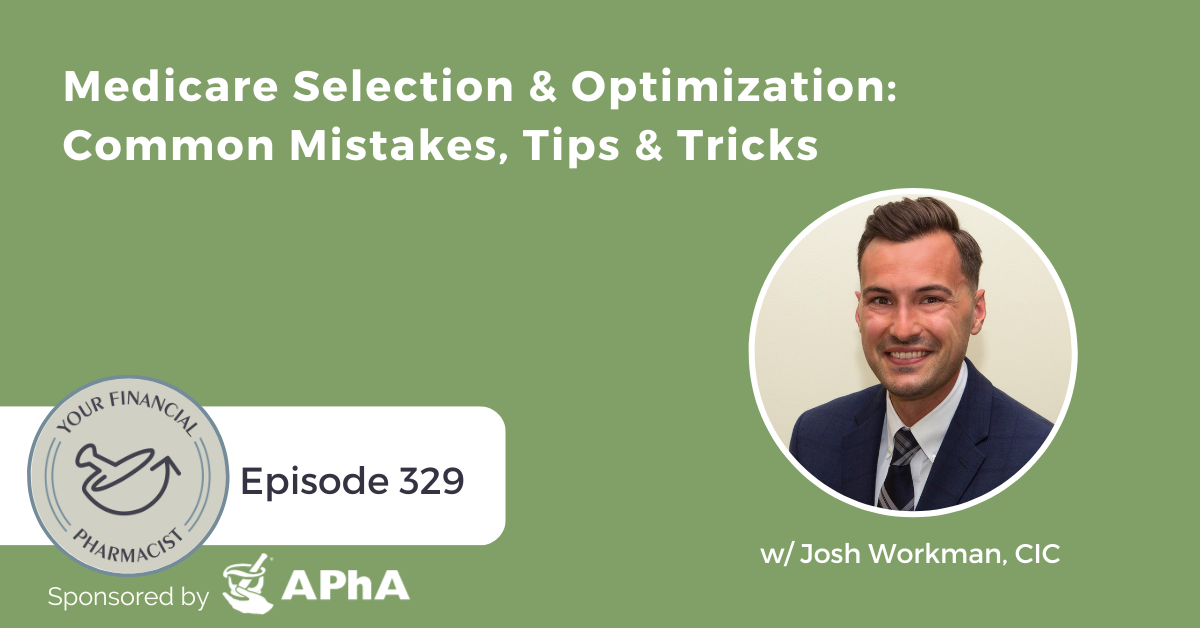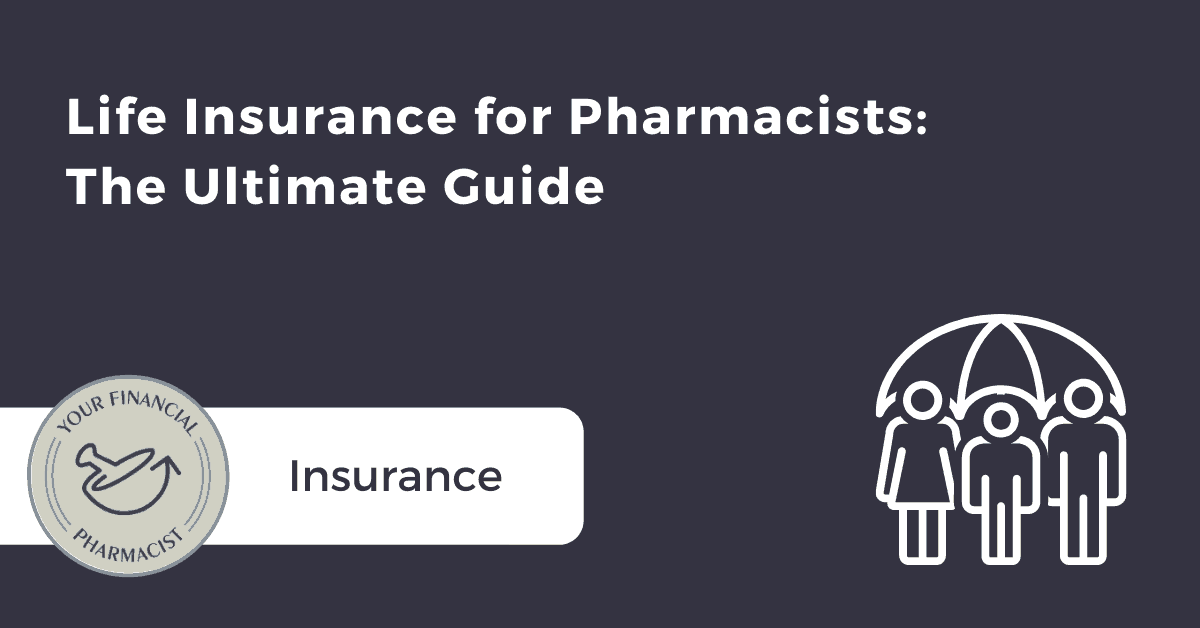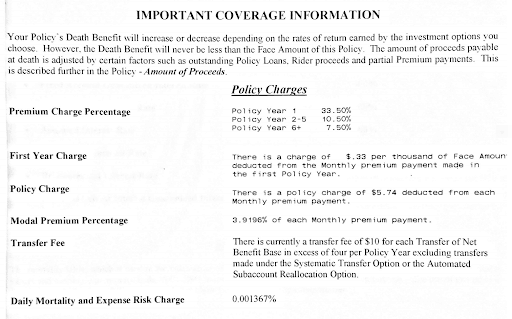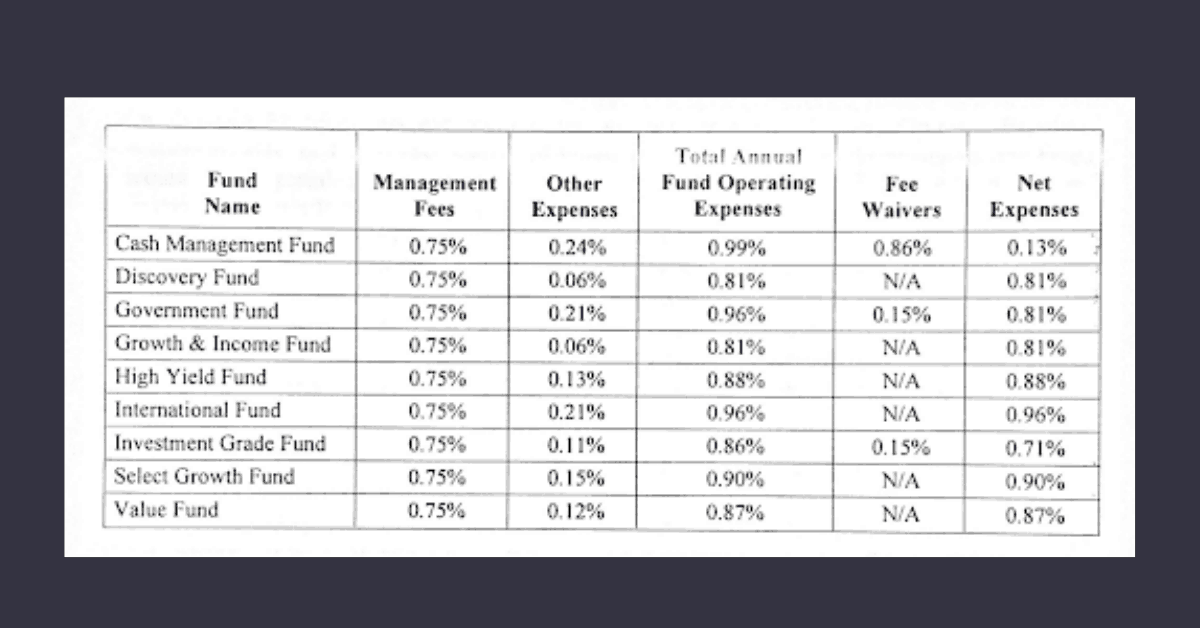On this week’s podcast, sponsored by APhA, Certified Insurance Counselor, Insurance Agent, and Medicare Specialist, Josh Workman, joins the show to cover Medicare 101 and considerations for selecting your Medicare coverage plan.
Episode Summary
Many people (including pharmacists!) aren’t fully informed about Medicare, the options they need to consider, and the pros and cons of each option. That’s why, in this week’s episode of the podcast, we brought on Certified Insurance Counselor, Insurance Agent, and Medicare Specialist, Josh Workman to give us a Medicare 101! Tuning in, you’ll hear about Josh’s role in the world of helping seniors navigate Medicare benefits, options for coverage, and the five main differences between Medicare Advantage and Supplement plans. Finally, he shares some words of wisdom for pharmacists struggling to answer Medicare questions for themselves, family members, and even clients.
About Today’s Guest
Located in the Akron Ohio area Josh Workman has been an insurance agent since 2010 with Medicare planning being his main area of focus. He started his career with Nationwide, but then moved to an Independent agency in 2014. Aside from helping individuals who are new to Medicare, he also works with professionals such as care facility coordinators, doctors and pharmacists as they assist their patients with Medicare plan decisions. Medicare can be extremely confusing so instead of the salesman angle, Josh takes an educational approach when helping his clients with Medicare Supplements, Part D Plans and Medicare Advantage Plans. One of his favorite parts of the job is teaching Medicare 101 classes to people who are new to Medicare.
Key Points From the Episode
- What Josh does in the Medicare world.
- The basics of Medicare and the timelines for selecting coverage.
- Two main options for coverage when going onto Medicare.
- Five differences between Advantage Coverage and Supplement Coverage.
- A quick summary of the two plans and the pros and cons of each.
- The kinds of plans Josh sees people choosing and why.
- Some of the dangers of being influenced by marketing when choosing a Medicare plan.
- Mistakes that Josh sees people making when buying a plan.
- Advice for leveraging the help of a Medicare agent for pharmacists.
Episode Highlights
“A lot of people make an assumption that original Medicare – Part A and Part B, includes prescription drug coverage. It actually does not. The only way you can get Part D is through an insurance company.” — Josh Workman [0:10:46]
“If you have to pay medical bills, if you have a network, you’re probably going to be paying less for your insurance because you’re subjecting yourselves to these medical bills and to this network.” — Josh Workman [0:15:21]
“Medicare Advantage is less expensive. There’s a network and there’s medical bills. Supplement is more expensive, but it doesn’t have a network and it doesn’t have medical bills.” — Josh Workman [0:20:20]
Links Mentioned in Today’s Episode
- Joshua Workman on LinkedIn
- Joshua Workman Email Address
- McMichael Insurance
- Use Coupon Code YFP to Get 25% off at APhA Membership
- YFP Planning: Fee-Only Financial Planning for Pharmacists
- Tim Ulbrich on LinkedIn
- YFP Disclaimer
- Subscribe to the YFP Newsletter
Episode Transcript
[INTRODUCTION]
[0:00:00] TU: Hey, everybody. Tim Ulbrich here, and thank you for listening to the YFP Podcast, for each week we strive to inspire and encourage you on your path towards achieving financial freedom. This week, I welcome to the show Josh Workman, a Certified Insurance Counselor, Insurance Agent, and Medicare Specialist.
Aside from helping individuals who are new to Medicare, he also works with professionals such as care facility coordinators, doctors, and pharmacists as they assist their patients with Medicare plan decisions. We tap into his Medicare experience to discuss five key considerations for evaluating Medicare benefit options. You’ll find this episode insightful and helpful, whether you are evaluating benefits for yourself or helping patients or other family members navigate this process.
All right, let’s hear from today’s sponsor of the American Pharmacists Association and then we’ll jump in my interview with Josh Workman.
[SPONSOR MESSAGE]
[0:00:50] TU: Today’s episode of the Your Financial Pharmacists Podcast is brought to you by the American Pharmacists Association. APHA has partnered with Your Financial Pharmacists to deliver personalized financial education benefits for APHA members. Throughout the year APHA will be hosting a number of exclusive webinars covering topics like student loan, debt payoff strategies, home buying, investing, insurance needs, and much more. Join APHA now to gain premier access to these educational resources and to receive discounts on YFP products and services. You can join APHA at a 25% discount by visiting pharmacists.com/join and using the coupon code YFP. Again, that’s pharmacists.com/join and using the coupon code YFP.
[INTERVIEW]
[0:01:37] TU: Josh, welcome to the show.
[0:01:38] JW: Thanks for having me, Tim.
[0:01:40] TU: Well, this is a treat. You and I have known each other for a long time when Jess and I lived up in Northeast Ohio. Our families got to know each other well. I’ve always appreciated the work that you’ve done on the Medicare side. It’s taken us over 300 episodes, but I’m excited to finally bring this together to be able to tap into your Medicare experiences and knowledge. Thank you so much for coming on.
[0:02:03] JW: Yeah. Thanks again for having me, Tim.
[0:02:05] TU: Josh, as we were planning for this episode, and here we are in the month of October, we’re talking about all different aspects related to the health insurance part of the financial plan and we realize that Medicare really isn’t a topic that we’ve talked really much about, maybe not even at all, but it’s such an important part of the financial plan for those that are making that transition into retirement.
As we were planning for this episode, we were thinking about a few different groups that may find value in this, right? Of course, there’s individuals listening that are getting ready to make that Medicare decision for themselves and making sure that they’re optimizing that benefit selection. But perhaps, even a bigger group would be, “Hey, I’ve got aging parents that are going through this phase.” Or, “I work at a pharmacy and often I have patients that come looking for help in terms of Medicare selection and what are some of the things that I should be thinking about.” I know, Josh, in your work as well, you consult with individuals that are going through selection, but also work with other providers and facilities as well. Is that correct?
[0:03:05] JW: Yeah. Yeah, that’s correct. I’m working with individuals or maybe in a group setting, like a seminar setting is a lot of what I do. But then, yeah, working with pharmacists, working with doctors, working with assisted living facilities, all those types of professionals have questions and I’m able to help their patients as well.
[0:03:25] TU: Let’s start with some of the basics of Medicare, Josh. Pharmacists get really a slim amount of this in pharmacy’s glamour. We talked about health insurance at large. We talked about the different parts of Medicare. It’s been 15 years for me, perhaps more for others that are listening as well. Let’s start with some of the basics, Medicare 101, Parts A through D. Just break down for us what those different parts cover.
[0:03:49] JW: Yeah, sure. There’s two parts to what’s referred to as original Medicare. That’s Part A, like Adam. Part B, like boy. A would be hospital benefits. You’d use your Part A coverage, for example, if you were in the hospital staying overnight for a surgery. Let’s say, Part B, like boy, that’s going to be medical benefits. Think of that as more outpatient-related things, specifically, like just going to the doctor, seeing a specialist, an outpatient surgery, those kinds of things. But then there’s a couple other parts as well, Medicare Part D, like David, or I like to think of it as D for drugs. That’s the easy way to remember that one. That’s going to be the prescription drug coverage. Part C is another way of saying Medicare Advantage. We’ll get into this, I believe in a little bit, but that would be Part C, which combines A, B, and D benefits into one plan.
[0:04:47] TU: Awesome. Timeline for coverage. This is something that I remember learning about this and just having the takeaway of like, this is important. You don’t want to mess up in terms of when you’re selecting coverage, making sure you’re not missing a deadline. What is the timeline for selecting coverage?
[0:05:03] JW: Yup. There’s going to be three main election periods if you want to think of them that way. Three times when you will be signing up for your plan, making decisions on your plan. I will say, there’s a lot of narrative out there that makes this a little scarier than it needs to be. It’s not that intimidating, but the first one is what’s called your initial election period. This is when folks are turning 65, they’re new to Medicare.
Another thing when someone could be using their initial election period is if they’re been on social security disability for 24 months, or if they develop end-stage renal disease or ALS, that’s another time prior to age 65, they can go on Medicare. Let’s use the turning 65, example because that’s the most common. It’s a seven-month window. It starts three months prior to your birth month, runs the month of your birth, and then three months after. A seven-month window when you can sign up. Most folks will use the three months prior and then start their benefits, the month of their birth. That’s the most common.
[0:06:12] TU: That is a pretty – I didn’t actually realize it was that long in terms of the seven months or the three months prior, the month of your birth date, and then the three months after. Then the other piece I’m thinking about here would be the transition or change, right? I had initial coverage I selected here. We’re using the example of 65, but I’m looking at other options in the future in terms of renewals. How does that work timeline-wise?
[0:06:33] JW: Yeah. Great question. That would be what’s referred to as the annual election period or annual enrollment.
[0:06:39] TU: Okay.
[0:06:40] JW: That is a window of opportunity towards the end of the year, getting into it now. October 15th through December 7th of the specific dates. That’s for folks who, yeah, let’s say, for example, they’re 67, they’ve been on Medicare for a couple of years now, but they want to reevaluate and see if the plan that they’re on now is going to be the best one for the coming year. They can evaluate that during the weeks, again, of October 15th through December 7th. Then their change, if they do make a plan change, it would start taking effect on January 1st of the following year.
[0:07:17] TU: Okay. Those are the two main ones I’ve heard you mention so far. So, that initial election and then the annual enrollment process. Anything else important to remember around the timeline for selecting coverage?
[0:07:30] JW: Yeah. There could be a third election period. Just think of them as special election periods. We do run into these. I do run into them every now and then, but if someone moves, for example. Moves out of state maybe or it could even be a move to a different county within the same state, they would qualify for a special election period to make a change. If someone gains or loses Medicaid eligibility, we recently saw a lot of that with the COVID benefits that were extended for folks on Medicaid.
They basically, couldn’t lose their Medicaid eligibility, but that stopped. I believe it was in April of this year. That qualifies for a special election period to make a change or if there’s other things too, like you have a parent who moves into an institution for lack of a better word, where they’re moving into a long-term care facility or a nursing home. That would also qualify as a special election period to make a change outside of annual enrollment. October 15th through December 7th.
[0:08:31] TU: Awesome. With that background information, let’s spend most of our time here talking about evaluating benefit options, what to look for, what to consider. Before we get into five main areas that you’ve seen, five big differences based on your experiences. I think it’s important that we differentiate at least at a high-level Medicare advantage and Medicare supplement plans because when we talk about some of these areas here in just a moment, we’re going to be referring to both of those and the different sides to consider between them. Define those further, for us.
[0:09:00] JW: Yeah. So generally speaking, you have two main options for coverage when you go on to Medicare. I should say this is what most folks do. Most folks will either go with a Medicare Advantage plan or a Medicare supplement. Medicare advantages is much more heavily advertised. Sometimes folks think that’s the only option they have, but they technically don’t. Supplements are an option as well, but there’s going to be five major differences between those two plans that can really impact how you receive your care, what you’re going to pay out of pocket when you use your insurance, how you get your drug coverage, if it includes perks like dental, vision, hearing, all those kinds of things.
Yeah. There are some pretty major differences between those. That’s what I spend most of my time with my clients who are new to Medicare, so they can make an informed decision on what’s best for them.
[0:09:53] TU: Yeah. I remember Josh, you shared with me as we were preparing for this episode. The worksheet that you have of the two sides of the street, right? Choosing a plan. Advantage versus supplement and going through these, which I really like, because I think this can become very overwhelming, either as an individual choosing coverage, helping a family member, helping a patient, especially when so often, as you mentioned, especially on the advantage plan side, there’s just a lot of advertising, right? That’s behind this.
The mailings, the commercials, etc. so really being able to take a step back and say, “What are the options and how can we objectively compare these. What do we need? What do we not need to make an informed decision?” I think is so important, not only financially, but also just have the peace of mind and being able to navigate some of the nuances involved here. Let’s start with those five big differences. Number one, Josh, is Part D in terms of how one receives Part D insurance coverage. Tell us more there.
[0:10:44] JW: Yeah. It’s important to know a lot of people sometimes make an assumption that original Medicare, what we talked about before, Part A and Part B, that includes prescription drug coverage. It actually does not. The only way you can get Part D is through an insurance company. Now, how it would work on either side of the street. Yes, the way I like to describe it. If you go with a Medicare Advantage plan, most of the time, those are going to include prescription drug coverage at no additional cost. If you go with the Medicare Supplement plan, however, it does not include prescription drug coverage or Part D, you have to buy that separately. Advantage is included. Supplement, it’s not included. You have to pick it up separately.
[0:11:27] TU: Number two, it relates to the network here. We’re thinking of options for providers, access to hospitals, something that folks are familiar with from other experiences with health insurance, but what are some of the factors to consider here as relates to network coverage and the two sides of the street?
[0:11:43] JW: Medicare Advantage plans are going to have a network. Meaning there’s a list of specific doctors, hospital systems, specialists that you need to stay within in order to have coverage or to pay the least amount possible. Medicare supplements, one of the big benefits of them is they do not have a network of any kind. You can literally go to any provider in the country, in the whole United States, that takes original Medicare and they have to accept your supplement. It doesn’t matter what insurance company you have. You could be in the Northeast Ohio area like we are and have an insurance company that’s local here and receive care in California and they’ve never heard of your local company, but they have to take it, because it’s a Medicare supplement.
[0:12:32] TU: That network piece, obviously, very important to folks. The third area, which I’m sure is the one we’re often focused on is the cost side of it, the medical bills or the cost-sharing, ultimately what we have to pay out of pocket when using insurance. What are some of the key differences here between the advantage and the supplement?
[0:12:50] JW: With a Medicare Advantage Plan, you will have medical bills along the way as you use your insurance, or just you could say if you use your insurance. By medical bills, I’m referring to deductibles, co-pays, and co-insurance. You may have a deductible. Honestly, most plans I offer, Tim, don’t have a deductible, folks have to reach, but they could.
A co-pay, you know how that works, most likely you pay $25 to your primary care, 40 to a specialist, those kinds of things. Then co-insurance is a percentage, right? You may have to pay 20% for durable medical equipment or 20% for chemo and radiation. The nice thing about Advantage Plans is that they do put a limit on what your medical bills can be. Most folks have this with your current insurance, even if you’re not on Medicare, called an annual maximum out-of-pocket expense.
All of your medical bills for the year can’t exceed your plan’s annual maximum. But know that, again, you will have them along the way, medical bills, that is. Whereas Medicare supplements, they don’t really have any medical bills that you’re going to have to worry about. Okay. Really, the biggest medical bill for the most popular supplement that I write out of my office is the Part B, like boy, deductible. Currently here for 2023. It’s $226, so you pay that for any Part B service. Once that’s paid though, Tim, the medical bills are done for the rest of the year.
[0:14:26] TU: Wow.
[0:14:26] JW: So that $226 deductible is your medical bill and it’s also your annual maximum. If you want to think about it that way.
[0:14:34] TU: Okay. So, very naive on this topic, Josh, but you’re just describing the differences and obviously when you talk about the Supplement plan and the lower amount, what I seem to hear is not insignificant, but a much lower amount on the deductible, less potential out of pocket versus when you reference the Advantage plans more out of pocket. What we tend to think of from our experiences right now for many of us with the insurance. So, is it fair to say that cost-wise monthly premiums, you typically see a vast difference between these two, because of that or is that – it depends?
[0:15:11] JW: No, you’re right. There’s a difference in cost. So, that would be the fourth big difference here between these two. As I’m sure listeners are putting together, if you have to pay medical bills, if you have a network. Well, you’re probably going to be paying less then for your insurance, because you’re subjecting yourselves to these medical bills into this network.
Medicare Advantage is going to be your less expensive route to take. It could even be, and folks may have seen this advertised. You could even see that these Medicare Advantage plans are zero dollars per month. Okay. Those are actually some of the most popular advantage plans.
[0:15:46] TU: Interesting.
[0:15:48] JW: Some of my clients will choose is the zero-dollar premium plan. Okay. Now with supplements, though, these are going to have a monthly cost. There aren’t any zero-dollar Medicare supplements. This currently, I mean, it all really depends on the area that you live in. I just work here in the state of Ohio, but here in Ohio, a good rule of thumb for a turning 65 mail for a Medicare supplement, depending on the plan letter that’s chosen is probably going to be somewhere between $130 to $150 a month for a Medicare supplement. Female would be a little bit lower. Again, that’s a pretty rough estimate, Tim, just depending on the service area that you’re in.
[0:16:37] TU: Yeah. It’s really helpful, though, Josh. I’m thinking about how this integrates back with the financial plan. It’s taking me back to episode 275. Tim and I talked about how to build a retirement paycheck, right? We’ve been accumulating funds. Hopefully, for the majority of our careers. Now we have to be able to replace what was coming from our income through the different retirement vehicles that we’ve built, right? 401Ks, IRAs, maybe we have some HSA funds that can come into play here, as well.
This is important, right? Because if you’re in the plans that you were just referencing on the supplement side, where let’s say you’ve got a monthly premium of $150 a month, and then you know what the deductible is going to be, like we can start to build those numbers into the monthly paycheck that we’re going to be receiving during retirement, essentially paying ourselves or if we’re on an advantage plan, and let’s just say there’s an advantage plan with the example you gave where there’s a zero-dollar premium, but we know what the out of pocket match your limit is, like, okay, we need planning for that, right, or planning for some of the other expected expenses from cost sharing of the healthcare.
You can really start to see how and understanding of the options and the plans and what the impact could be annually, as well as monthly when you talk about something like a monthly premium, could build into the financial plan, build into building that retirement paycheck as we make that transition into that phase.
[0:17:56] JW: Yeah, exactly.
[0:17:58] TU: All right. Number five, Josh. This is one that I didn’t think about that was really interesting when you were talking about this in our preparation for the show. With some of the variances between the plans, when it comes to things like dental, vision, hearing, or the extras, tell us more here.
[0:18:14] JW: When it comes to dental, vision and hearing, this is becoming a much bigger issue, I would say than it used to be. I’ve been doing this for several years now, and back when I started, folks weren’t that concerned about dental, vision, hearing. However, advertisements on TV, the mail that folks are getting that are turning 65 heavily focuses on this side of things. Medicare Advantage plans are going to include dental vision and hearing benefits, as well as other things too, like over-the-counter items, allowances that the plans give people several dollars a month that they are a quarter rather than they can use to buy Tylenol or Advil or Band-Aids and Toothpaste, that kind of stuff.
Advantage plans are going to include those kinds of things. Again, it’s usually at no additional cost. Even a zero-dollar plan would include these things. Whereas Medicare supplements do not include any of these kinds of things, but you can buy them separately, just like you buy the Part D, separately. You can pick up dental vision hearing benefits at an additional cost if you’d like them.
[0:19:17] TU: Josh, before we wrap up by talking about some of the common mistakes that you’re seeing, folks making when it comes to evaluating benefit options and selecting a policy. Summarize here for us the five points that we just talked about as, again, individuals may either be choosing their own policy, working with a family member or working with patients that they can take away this information.
[0:19:36] JW: Yeah. The easy way that I like to describe it is this. If you go with a Medicare Advantage plan, this is going to be your less expensive route to take. It’s going to include Medicare Part D. It’s going to include dental vision hearing. However, you are going to have a network and you are going to have medical bills along the way as you use it. Medicare supplements are your more expensive route to take. They don’t include drug coverage. They don’t include dental, vision, hearing, although you can buy them separately if you’d like. However, you don’t have the medical bills and you don’t have the network to be concerned with.
If you’re a pharmacist out there and you’re trying to quickly explain this to a patient, maybe just go about it that way. Medicare Advantage is less expensive. There’s a network and there’s medical bills. Supplement is more expensive, but it doesn’t have a network and it doesn’t have medical bills.
[0:20:29] TU: Great summary, Josh. I’m curious, like rough numbers. What do you see as like a distribution between these two buckets as you work with those going into Medicare enrollment?
[0:20:39] JW: Yeah. That is a great question. That’s one that’s become very common as my clients are sitting down trying to make a decision on what they want to go with. I’m finding now, Tim, and it didn’t used to be this way, that it is about a 60-40 split. About 60% are going the Advantage plan side and about 40% are going the supplement side. When I first started, it was probably 70-30 the other way or heavily weighted on the supplement.
I think one of the big reasons for this is the marketing. Advantage plans are much more heavily marketed to people who are new to Medicare. I said before, a lot of people think that they are the only option. Not that they’re a bad option, but again, folks are just having much more education, getting much more education about Advantage plans than they are supplements.
[0:21:32] TU: Let’s talk about that marketing because I think that’s one of maybe a little bit too harsh to call it a mistake, but I think the influence of the marketing can be real. I’ve seen many of these commercials, Josh. I think I know the ones you’re referring to and just the impact that whether it’s mail marketing, TV, radio, a combination of can have and sway in someone in one direction or another. Tell us more about that. Even some of the other common mistakes you may see folks making when they’re going through the selection process.
[0:22:03] JW: Yeah. Those commercials are becoming very popular. We’re talking about like the Joe name, this commercials guys that you can’t help but see, especially getting here into the fall into annual enrollment. Those commercials, the mistakes I see people making is buying a plan based off of what they’re seeing just on those commercials alone. If you actually pay attention to one of them, they are referencing primarily the perks of the plans.
The dental, vision, hearing benefits, they may even say things like call and check your zip code, because you could get a plan where you don’t have to pay for your Medicare premium and at all. The plan will pay for it for you. In my opinion, those aren’t the only things you should factor in when you’re buying health insurance. You should factor in other things too, like does your doctor take the plan? That’s a pretty big one.
Yeah, you might have a nice dental benefit, but when you need to go to your primary care physician and they say, “No, we don’t take this.” How valuable is that dental benefit now? Other things, folks don’t necessarily consider, especially on, and we can get into this more if you’d like, but these relatively new to the game Part B, give back plans that pay some or all of your Medicare premium. You got to think from an insurance company’s perspective, if they’re willing to pay your Medicare premium for you, what do you think that’s going to say about the benefits they’re going to provide in the plan?
[0:23:31] TU: Yeah.
[0:23:32] TU: Primarily translates to higher medical bills to you. These are just things that I feel like are important for people to consider that you’re buying a health insurance plan, you want it to be solid when you need it. You don’t necessarily want to buy a plan, because it gives you $100 every quarter and over-the-counter items limit. Those are some of the mistakes I see people making. They buy a plan based off of perks, not necessarily on the day-to-day usage of the plan that could be more important.
[0:24:04] TU: Yeah. Which is, it’s a different form of marketing, right? It’s not necessarily a commercial, but it’s a different form of marketing to hook someone into a policy. That’s a good a good call out. I think both of those Josh, to me highlight the value and you showed me that worksheet, that side-by-side worksheet of, “Hey, we’re looking at supplement plans, we’re looking at advantage plans.” We’re applying somebody’s personal situation. You’re sitting down with them one-on-one, talking through the benefits and the options.
That really brings the life to me, the value that an agent, especially someone specializing in Medicare, such as yourself can be helping, whether it’s the person directly that’s selecting the benefits, whether it’s family members that are involved, or for our pharmacist community, again, especially those working in community practice. I know these questions come up all the time in terms of, “Hey, I’m a patient, I go to the pharmacy, I ask my pharmacist about the policy or what should I be thinking.”
My question here is your work is obviously in Ohio. If we have pharmacists in Northeast Ohio, shout out to Josh, get connected with him for sure as well, but much of our listeners may be across the country. So, words that you would have to share in terms of what are some things that folks can look for in trying to develop a relationship with an agent as a pharmacist or for those that are looking to select a policy for themselves or a family member and partnering with an agent that way, as well.
[0:25:23] JW: Yeah. I mean, first of all, from the pharmacist’s perspective, I do work with several pharmacists and chains and whatnot. I would say from your perspective, don’t feel like you need to be the expert on Medicare Part D, specifically. You can say, “Hey, I don’t know all the answers on what plan you should pick, but here’s a guy you can call, or here’s a girl you can call, they know. They do this for a living.” The other thing too, guys, is it saves you time.
I mean, I see, I’m in and out of pharmacies a lot. I see how busy you are. I can imagine how stressful it is when you have 10 or 20 prescriptions you need to fill and somebody asks to go into the private room and say, “Hey, what prescription drug plan is going to be best for me next year?” It can just take up a lot of a lot of time I would imagine. Again, having an agent you can refer to, to handle those questions for you would save you a lot of time and alleviate that pressure of having to feel like an expert.
[0:26:26] TU: Yeah. Well, this was great, Josh. I really appreciate you coming on the show sharing your expertise. As I mentioned at the beginning, it’s been a long time in the making covering the topic we haven’t done much about before. We will link in the show notes. Josh’s LinkedIn profile, email. If folks have questions, as well as a link to the insurance firm that he works with right now. So, you can check all that information out in the show notes. Josh, thanks so much again for coming on. I really appreciate it.
[0:26:51] JW: Yeah. Thanks for having me, Tim. Go Bills.
[0:26:53] TU: That’s all. This is the year. Let’s do it.
[0:26:55] JW: This is the year, Tim. It’s the year.
[0:26:57] TU: Awesome. Thanks, man.
[0:26:58] JW: Yup.
[0:26:59] TU: Before we wrap up today’s episode of the Your Financial Pharmacists podcast, I want to again thank our sponsor, the American Pharmacists Association. APHA is every pharmacist ally advocating on your behalf for better working conditions, fair PBM practices, and more opportunities for pharmacists to provide care. Make sure to join a bolder APHA to gain premier access to financial educational resources and to receive discounts on YFP products and services. You can join APHA at a 25% discount by visiting pharmacist.com/join and using the coupon code YFP. Again, that’s pharmacist.com forward slash join using the coupon code YFP.
[DISCLAIMER]
[0:27:39] TU: As we conclude this week’s podcast, an important reminder that the content on this show is provided to you for informational purposes only and is not intended to provide and should not be relied on for investment or any other advice. Information in the podcast and corresponding material should not be construed as a solicitation or offer to buy or sell any investment or related financial products. We urge listeners to consult with a financial advisor with respect to any investment.
Furthermore, the information contained in our archived newsletters, blog posts and podcasts is not updated and may not be accurate at the time you listen to it on the podcast. Opinions and analyses expressed herein are solely those of Your Financial Pharmacists, unless otherwise noted, and constitute judgments as of the dates published. Such information may contain forward-looking statements, which are not intended to be guarantees of future events. Actual results could differ materially from those anticipated in the forward-looking statements.
For more information, please visit yourfinancialpharmacist.com/disclaimer. Thank you again for your support of the Your Financial Pharmacist Podcast. Have a great rest of your week.
[END]
Current Student Loan Refinance Offers
Note: Referral fees from affiliate links in this table are sent to the non-profit YFP Gives. | Bonus | Starting Rates | About | YFP Gives accepts advertising compensation from companies that appear on this site, which impacts the location and order in which brands (and/or their products) are presented, and also impacts the score that is assigned to it. Company lists on this page DO NOT imply endorsement. We do not feature all providers on the market. |
$800* Loans* ≥150K = $800 100-149K = $450 <100K = $350 | Variable: 5.28%+ APR (with autopay)* Fixed: 5.28%+ APR (with autopay)* *All bonus payments are by gift card. See terms | The "Kayak" of student loan refinancing, Credible displays personalized prequalified rates from multiple lenders | ||
$750* Loans ≥150K = $750* ≥50K-150k = $300 | Fixed: 5.49%+ APR (with autopay) | A marketplace that compares multiple lenders that are credit unions and local banks | ||
$500* Loans ≥50K = $500 | Variable: 4.99%+ (with autopay)* Fixed: 4.96%+ (with autopay)** Read rates and terms at SplashFinancial.com | Splash is a marketplace with loans available from an exclusive network of credit unions and banks as well as U-Fi, Laurenl Road, and PenFed |
Recent Posts
[pt_view id=”f651872qnv”]













